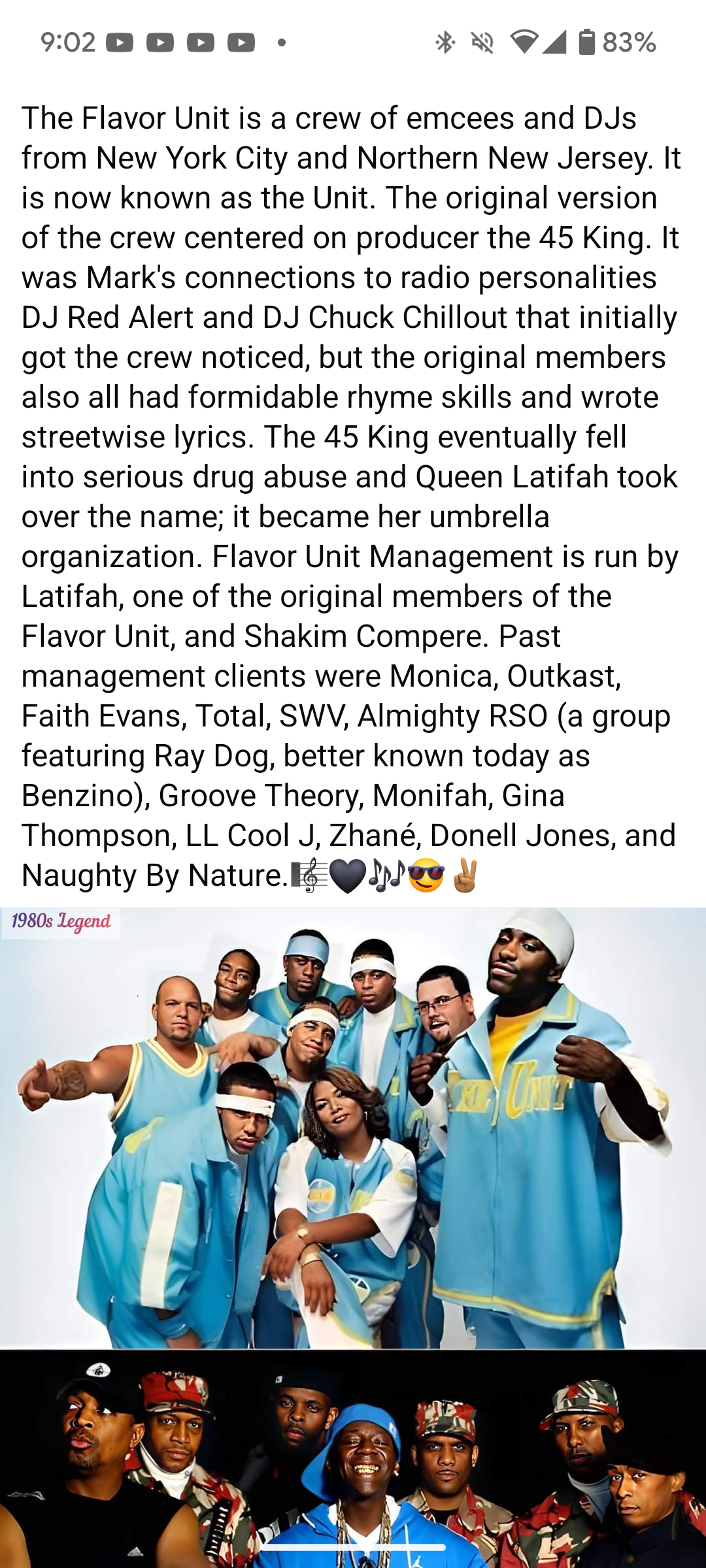AI hype has died down a bit since last year. Many people laugh and point at the weird hands and bizarre imagery AI tools commonly generate. Still, low-quality AI-generated copy and images flood social media and other sites.
The nostalgia-driven engagement bait below looks like an AI-generated mess. It fails to provide context and has meh, truthy copy paired with meaningless pictures.
Let's mock it together.
No Hip-Hop fan calls The Flavor Unit "The Unit." But an AI drawing from publicity materials from the post-prime "The Unit" era might do that. Also, no knowledgeable human being discussing The Flavor Unit's history would select a photo of "The Unit" over a picture featuring Queen Latifah with luminaries like Naughty by Nature, Lakim Shabazz, and Apache. Another acceptable option would have been a photo of the original pre-Naughty Flavor Unit described in The Original Flavor Unit: An Oral History (published by Red Bull Music Academy in 2015).
The second photo is of Public Enemy, which was probably AI-selected because of Flavor Flav. Again, no human Hip-Hop fan would make that mistake. Also, since it's conventional for the first photo to represent an initial classic era and the second photo to represent a latter era in these engagement-fishing posts, selecting a PE photo is doubling down on the inhuman craziness after using "The Unit" photo.
The sentence suggesting Queen Latifah took over the name "Flavor Unit" after Mark The 45 King became addicted to drugs is inaccurate and inappropriate for a post celebrating the crew. Yes, the late 45 King suffered from addiction, but there isn't a documented direct relationship between that issue and Queen Latifah and Shakim Compere incorporating Flavor Unit in the early 90s.
Other than concerns over sustainability and exploiting creative people, I don't oppose AI becoming a regular part of human/machine centaur lifestyles. I just prefer to ignore, dismiss, or mock dreck that contributes to enshittification. "Prompt" responsibly and complete the centaur with people who can validate the machine's output.
Bonus Content: On Centaurs
Here's an excerpt from a blog I wrote nearly a decade ago about Clive Thompson's Smarter Than You Think that explains the centaur concept.
Smarter Than You Think is Clive Thompson's thoughtful book on how technology enhances our cognitive abilities and the anxieties that emerge with every innovation.
Socrates feared writing would destroy the capacity to memorize information and ruin Greek traditions of debate and dialectic.
Ye Mengde of 10th-century China worried that the wider availability of written records made possible by China's advanced printing technology would weaken memories and cause errors to be repeated endlessly.
Tools and palaver in 15th-century European coffee shop conversations, 19th-century novels and periodicals, 20th-century telephone calls, and 21st-century social media were all supposed to render us into frivolous blockheads or anti-social narcissists.
Take a breath. As Thompson documents, our species adapts.
As we adapt, we offload, enhance, and extend memory and cognition to and through our tools. The memory of thoughts and information captured in writing, audio, video, and photos is of significantly greater volume and fidelity than individual human memory.
The external memories captured through our arts are then available to us for deeper analysis, consideration, sharing, and collaboration. We see trends and patterns. We access stories, facts, templates, and instructions. Machines become what Thompson calls "transactive memory buddies" throughout our daily lives.
Our connected tools have increased our capacity to quickly and effectively use external memory while also providing us with new capabilities and opportunities for play. Through blogging and social media, we engage in public thinking and experience "ambient awareness" of the thoughts, activities, and locations of others. We leverage "multiples." We google the terms I've placed in quotes. Regular people have resources to coordinate unprecedented collaboration for games, problem-solving, art, exegesis, education, advocacy, "sousveillance," and other activities.
If you are reading this, you are a centaur
Thompson introduces readers to a new meaning for "centaur" that emerged among chess players who play in concert with specialized chess software. In this context, "centaurs" are people who engage challenges and the world itself as composite beings: part human and part information technology.
Centaurs are common, and if you are reading this, you probably are one. Google is your co-pilot. Your ambient awareness tells you which hoaxes are frightening your Facebook friends and whoever you stalk on Twitter. You hire rides with Uber to get to restaurants you found with Yelp or OpenTable. You got escorted out of the restaurant, but you did it for the Vine.
Clearly, this excerpt reflects its time. TikTok supplanted the late Vine while Facebook and Twitter shamble on as leading platforms for enshittified experiences. However, the basic idea remains valid and extends to how today's centaurs can use AI effectively.
